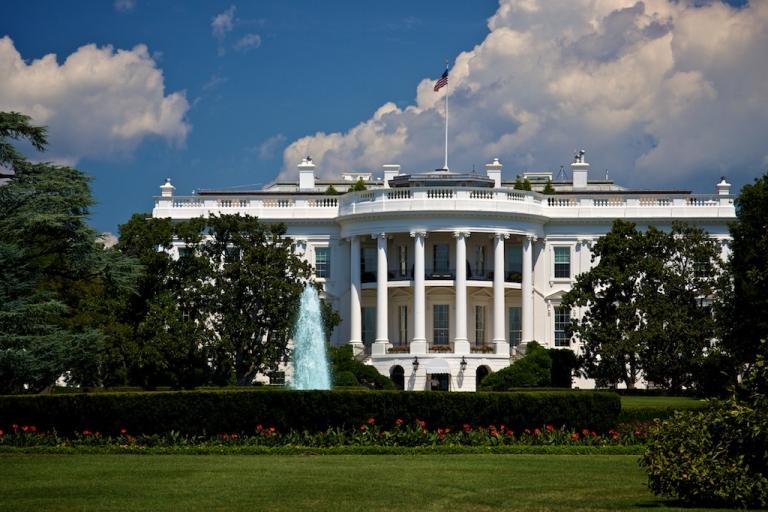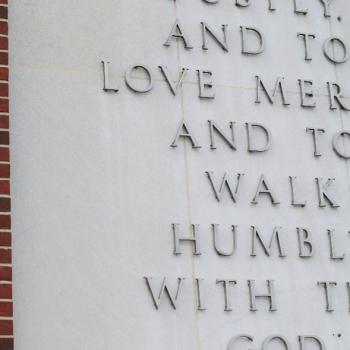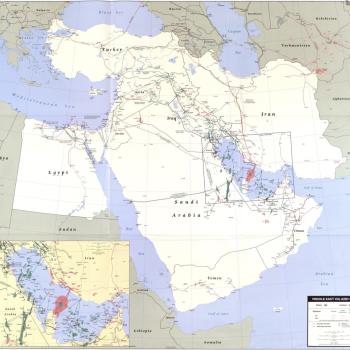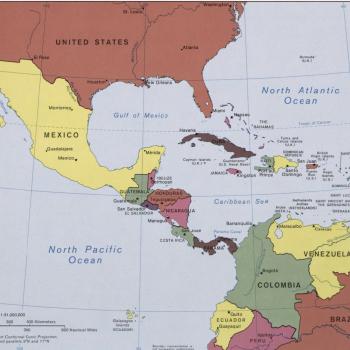Did you hear about the election they just had in the US? It actually got quite a bit of coverage.
So is there anything new to say about it? Well, I might have something different to say, because I am working with 20-20 lack-of-foresight. To be precise, I am writing a week before the election, and have no clue which of the two candidates, whom I will call Smith or Jones, is going to win. That gives me a wonderful impartiality in what I have to say. By the time you read this, democracy will have democked, and you definitely know that Smith won, but I don’t, and I am not going to update anything I write to reflect the actual outcome of the election when it does occur.
So what do we do next? I am thinking specifically of the religious angle of the question. What, if anything, should Christians be doing now, right after the election? This question occurred to me when my own Episcopal church in Pennsylvania announced special opportunities for prayer and reflection on the eve of the ballot. The church announced that it “will hold a worship service to come together as a community, offer prayers, and find comfort during this time of stress and uncertainty.” On election day itself, the church remained open all day “for individual prayer and reflection.” That was a superb idea, although I was concerned about what the content of some of those prayers might have been: was it a ferocious “Lord, smite them as the Amalekites! Let them be unto you as publicans and sinners!” Seriously, were people just praying for victory for their particular cause?
Maybe I misjudge them. Maybe they really were praying for peace, justice, and reconciliation. I’d love to think so. In my street, many houses have yard signs declaring support for either party, except for one belonging to a Mennonite minister that says just “Be kind,” citing Ephesians 4.32. What an idea.
Towards Reconciliation
So what next? What should be the course for anyone who believes in a religion of peace, forgiveness, and reconciliation? Here follow a couple of suggestions. I am addressing them as much to myself as anyone else because, as I say, I don’t presently know who will win.
Most fundamentally, I really think Christians get far too invested in fighting for the causes of Smith or Jones, Tweedledumb or Tweedledee, as if it somehow mattered in the grand divine scheme, any more than (say) the war between the Houses of York and Lancaster did five hundred years ago. It is a deadly error to assume that God supports any particular faction in these contests, any more than we jokingly suggest in sporting competitions (“Of course God is a Penn State fan! Why else is the sky blue and white?”) Nor, of necessity, is the other side doing the Devil’s work.
Such a view is pernicious nonsense, all the more so if it leads believers to plunge wholeheartedly into the whole toxic and obsessive world of fervent partisan lies and contorted propaganda, on either side of the divide. Driven in large part by social media and shifting standards of media and news presentation, American electoral contests have become ideal vehicles for the institutionalization of hatred, dehumanization, paranoia, and mendacity.
At a personal level, I have witnessed the effects of current partisanship on people I used to think were rational and critical. I am not sure they are ever coming back to anything like normality as it once existed. Nor can I cite too many real-world cults that have had such a pernicious effect on the minds of their devotees. Incidentally, my comment here is totally non-partisan: I have seen people on both sides of the divide vanish into their respective rabbit holes.
The world remains the world, and the more you invest in it and its delusions, the worse for all of us. Maybe that text about “My kingdom is not of this world” really means it, and if we forget that, we are making the greatest mistake of all. Why do we always act as if the contrary is true?
Well, that gets into theological issues that might be too weighty to argue through right now, but let me make some more practical (and secular) suggestions for understanding and reconciliation.
Half a Country
If your candidate won, then celebrate by all means, and enjoy victory. But maybe minimize the crowing or gloating, don’t claim a moment of national salvation or resurrection, and above all, don’t show contempt for the other side. The one thing I can say with near certainty is that if your person won, then around half the country disagrees with you and them, I mean really disagrees, very seriously. They are in pain right now. They think the country is on a direct path to Hell, and I don’t just mean that in a spiritual sense. They have a sense of apocalyptic doom.
More to the point, those people are not going away. Nor are they going to change their opinions because they are constantly attacked and mocked. They are going to hold those views more strongly and passionately. You know the bumper sticker “The floggings will continue until morale improves”? You know that is meant to be a joke, right?
The odds are that you don’t personally know anyone who holds an opposite view about the relative virtues of Smith and Jones, and that kind of separation in itself is a horrific statement about any society, and its chance for survival as a democracy. But assume you do know someone. How about offering some sympathy, some compassion? Not to mention some practical advice, grounded in history.
A Country Is Far More Than Its Presidents
Try saying something like this. So your candidate Jones lost and you hate that, I understand that, and personally, I am glad they did lose. But remember how the US system works. We elect a President, not a dictator. Presidents may want to do all sorts of things, but they are really limited in what they actually can do. We have a Congress, and courts, and both are still operational. So is the extensive bureaucracy that implements policies.
That really is a critical point that often gets missed, and I blame historians for perpetuating the error. When we describe US history, we always do it in terms of Presidents and their elections, because they seem to mark such critical dividing points. We think of the Reagan era or the Obama years. But how much do such individuals actually matter in shaping the country and its history in terms of what actually affects people’s lives? Nothing like as much as we pretend. I’ll come back to this point.
What Goes Around…
More important, even very strong presidents are highly constrained by Constitutional realities. Do realize that in two years, TWO, not four, there will likely be a massive sea change in politics, which will almost certainly benefit your side. Pretty much always, there is a mid-term reaction against the established order as symbolized by the new president, and that will be reflected in Congressional and Senate elections. Focus on 2026.
Do you hate the newly-elected President Smith for what that person believes and promises? Well, don’t worry too much. In two years time, their power to do much will be massively constrained.
The Greatest Country In The World, Seriously
It also pays to recall that the country that just made this presidential decision is not going away, not going to change fundamentally, even if particular elections don’t work the way you want. But you really can’t go anywhere else. Somehow, however they voted, the two very different halves of the country have to find ways of living together, no option.
SPOILER ALERT: I am about to say something that sounds like I am venturing into sentimental cliché. But it does bear directly on my point about just how much particular presidential elections do (or don’t) matter.
I can give you a list right now of things that, in my view, are deeply wrong and troubling about the US, and the directions it is taking. But maybe, with all its problems, this really is the best country in the world to live, in terms of its prosperity, safety, and freedoms. And changes elsewhere in the world make it even more so as time goes on. If you want to argue with that contention, feel free to offer alternative suggestions as to other candidates for model countries, and I can tell you why they don’t work.
Do particularly let me know if you can think of a country that lacks a heritage of violence, conquest, land theft, and systematic injustice, a society that has always been marked by justice, peace, and equality. Good luck on that one. To be more specific, do point me to societies that for lengthy periods of their history did not institutionalize slavery, or some functional equivalent of that system, or did not practice systematic racial/ethnic oppression. The main difference with the United States is the degree to which this country has worked to come to terms with its past.
You can fantasize about moving to some other country where they do things better, but you can’t really do such a thing. Where would you go? When people mention moving to Country X, they are usually going on a stereotype of that country that is probably a decade or two out of date, and those people are not talking to current residents of that country, who are deeply disenchanted with it and probably want to move to the USA anyway.
So you are going to move to England for its socialized medical system and its Labour government? Or to Russia because they don’t have gay marriage? Really? And you still think there is such a thing as Scandinavian social democracy? Don’t get me started on Canada…
To quote the ancient scripture, “There is no more New Frontier/we have got to make it here.”
Presidents Come and Presidents Go…
But could even a dreadful new president ruin the “greatest country”? Think about the country’s astonishing fundamental strengths, and more specifically, look at the mind-boggling US-driven and -dominated technological and economic transformation of the past three decades. I quote a recent Economist:
Over the past three decades America has left the rest of the rich world in the dust. In 1990 it accounted for about two-fifths of the GDP of the G7. Today it makes up half. Output per person is now about 30% higher than in western Europe and Canada, and 60% higher than in Japan—gaps that have roughly doubled since 1990. Mississippi may be America’s poorest state, but its hard-working residents earn, on average, more than Brits, Canadians or Germans.
Do read that last sentence carefully. Have you wondered why the USA is the unerring magnet for attracting ambitious and enterprising people from all corners of the world?
You may remember China, which was allegedly on its way to overtaking the US as the world’s largest economy? It is facing a monumental series of crises, financial, industrial and above all, demographic. Its nominal GDP was 75 percent of the US figure in 2021, but 66 percent today. Maybe, to adapt a saying once applied in another context, China is the country of the future, and it always will be.
And before you say that material prosperity is not all that matters, you are exactly right. But poor countries stand no chance whatever of dealing with the world’s problems, of creating justice and spreading prosperity. Climate issues alone are going to be very, very, expensive.
More to the point, that spectacular three decades or so – the American period since 1990 – involved administrations by some presidents that you loved and some you loathed. We are dealing with Bush I, Clinton, Bush II, Obama, Trump, and Biden. That is a scarily diverse bunch of individuals and policies. But those individual realities interfered not at all with that overall trajectory, with that spectacular period of growth and development. The social, cultural, and technological revolution launched by smartphones and social media began under Clinton and Bush II, and soared under Obama. Technically, the utterly revolutionary innovation of the iPhone arrived under Bush II, in 2007, but no sane person would describe it as a product of the “Bush era,” of the “Age of W.”
To ask that seditious question once more, how much do presidents actually matter? So what makes you think the incoming President Smith is going to make any greater impact, for good or ill?
Doing Unto Others
Anyway, if my own Jones candidate actually does lose, that is the kind of message that I would like to hear. It would really encourage me to reconcile to the other side. If the candidate I prefer does win, then may I apply these lessons when dealing with others.

















